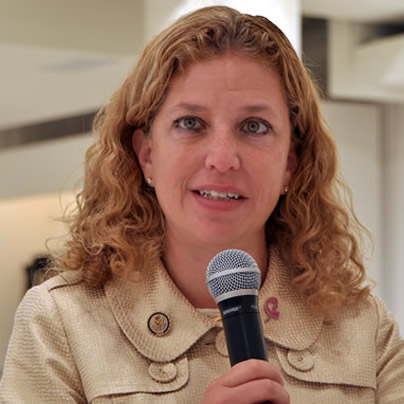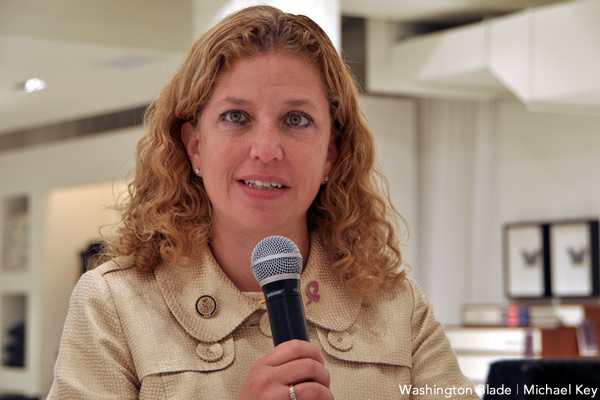News
Will new voices call on Obama to sign ENDA exec order?
New letter gives Dem leaders, Republicans chance to seek action


DNC Chair Debbie Wasserman Schultz is among those who haven’t articulated support for an ENDA executive order. (Washington Blade file photo by Michael Key)
A new letter is being circulated among members of Congress urging President Obama to sign an executive order barring discrimination against LGBT workers, raising questions about whether pro-gay lawmakers who have previously made no explicit calls for the directive will take the opportunity to do so.
Key members of the Democratic leadership have yet to call for the executive order as have Republicans who’ve already articulated support for the Employment Non-Discrimination Act, legislation that would bar workplace discrimination against LGBT people.
The letter that’s being circulated among lawmakers calls on Obama to sign the order in the wake of his declaration that 2014 will be a “Year of Action” through administrative means if Congress doesn’t act on his legislative agenda.
“As we continue to work towards final passage of the Employment Non-Discrimination Act (ENDA) with strong bipartisan support, we urge you to take action now to protect millions of workers across the country from the threat of discrimination simply because of who they are or who they love,” the letter states.
A source familiar with the letter said the opportunity to sign it would close at the end of Monday.
Although this is the first letter intended to include signatures from members of both the House and Senate, it’s not the first time lawmakers signed letters calling for the executive order. Last year, 110 House Democrats signed a letter seeking the directive and 37 senators signed a letter to that effect.
But neither of those letters included names of lawmakers in Democratic leadership or Republicans — even though many had previously articulated support for the executive order or ENDA in some capacity. The newly circulated letter presents an opportunity for those lawmakers to augment the call with powerful voices and create a bipartisan effort to push Obama to take administrative action to protect LGBT workers from discrimination.
The top members of the House Democratic Caucus — House Minority Leader Nancy Pelosi (D-Calif.), House Minority Whip Steny Hoyer (D-Md.) and Assistant House Minority Leader Jim Clyburn (D-Calif.) — each refrained from signing the House version of the letter in 2013. None of the offices for those lawmakers responded to the Washington Blade’s request to comment on whether they’d sign the letter this time around.
[UPDATE: Mariel Saez, a Hoyer spokesperson, told the Washington Blade on Monday following the initial publication of this article that the Democratic Whip “is signing onto the letter.”]
Even though she didn’t sign the letter, Pelosi has been on the record in support of the executive order since 2011, when the Blade asked her during her weekly news conference if she’d support that action. She also said Obama “of course” should sign the directive in January when speaking with The Huffington Post.
Clyburn was quoted as saying by The Huffington Post he feels “very strongly” that Obama should sign the executive order just months ago, reportedly adding “I don’t know where I would be today if the executive order had not been used to get rid of slavery.” The Blade is unaware of any public comments from Hoyer on the LGBT executive order.
At the time the 2013 letter was made public, Pelosi’s office cited a policy that she refrains from signing group letters because of her position in Democratic leadership. However, she had earlier signed her name to letters seeking action from the administration to help bi-national same-sex couples in addition to signing amicus briefs calling on federal courts to strike down the Defense of Marriage Act.
[UPDATE #2: Following publication of this article, Drew Hammill, a Pelosi spokesperson, said his boss won’t sign the letter currently being circulated, noting she rarely signs group letters, and said she’ll instead take her own course of action.
“Leader Pelosi has publicly expressed support for this executive order and will be sending her own private letter to the President on this matter,” Hammill said.]
Also conspicuously absent from the 2013 letter is Rep. Debbie Wasserman Schultz, who also serves as chair of the Democratic National Committee and is known for her support of LGBT rights. In the past week, she’s announced the DNC would form a lesbian leadership council and hired a gay operative as the DNC’s national political director.
Neither Wasserman Schultz’s congressional office in D.C. nor the DNC responded to the Blade’s request for comment on whether she’d sign the letter this time around.
In January, Wasserman Schultz told The Huffington Post she broadly supports the idea of Obama using his executive authority, but refused to say whether that principle applies to an executive order for LGBT workers.
Wasserman Schultz’s name was also absent from letters seeking support of bi-national same-sex couples. At the time one letter was signed in 2011, Wasserman Schultz told reporters during an Immigration Equality fundraiser she supported the action, but didn’t feel comfortable making demands on the administration because of her position in the DNC.
“Given that I’m the chair of the DNC, it’s a little odd for me to be asking the administration to do specific things,” Wasserman Schultz said at the time. “So I personally support it, but because I’m also the political voice of the president, asking the president to do things publicly can get a little awkward.”
On the Senate side, Senate Majority Leader Harry Reid (D-Nev.) also didn’t sign his chamber’s version of the letter in 2013. His office didn’t respond to a request for comment on whether he’ll add his name this time around.
Reid has offered a nuanced position on the executive order. In February, he told The Huffington Post, “If the president decides to do it, I’d be in favor of it.”
But on either the letter signed by the House or the Senate in 2013, not a single Republican signed their name. If a single one did so this time around, it would represent the first time that a Republican lawmaker had called on Obama to sign an executive order.
None of the offices of 10 Republican senators who voted for ENDA on the Senate floor responded to a request for comment on the letter. Those are Sens. Kelly Ayotte (R-N.H.), Susan Collins (R-Maine), Jeff Flake (R-Ariz.), Orrin Hatch (R-Utah), Dean Heller (R-Nev.), Mark Kirk (R-Ill.), John McCain (R-Ariz.), Lisa Murkowski (R-Alaska), Rob Portman (R-Ohio) and Pat Toomey (R-Pa.).
Despite being an original co-sponsor of ENDA, Kirk has previously spoken against an executive order prohibiting federal contractors from discriminating against LGBT workers.
“If we load executive order upon executive order, all of which would be wiped out the day after the president of the other party takes power, you really haven’t advanced the ball much,” Kirk said in 2011. “That’s why the legislation is absolutely necessary.”
In the House, six Republicans co-sponsor ENDA: Reps. Ileana Ros-Lehtinen (R-Fla.), Richard Hanna (R-N.Y.), Charlie Dent (R-Pa.), Michael Grimm (R-N.Y.), Chris Gibson (R-N.Y.) and Jon Runyan (R-N.J.).
According to the Huffington Post, Ros-Lehtinen has said she doesn’t support the executive order. Of those six Republicans, only Dent’s office responded to the Blade’s request to comment on the letter, and the response was negative.
“Congressman Dent believes that the regular legislative process is the best way to proceed in making this critical legislation outlawing workplace discrimination the law of the land,” said Dent spokesperson Shawn Millan.
Gregory Angelo, executive director of the Log Cabin Republicans, said he doesn’t know whether Republicans will sign the letter, but hopes to see some GOP names calling for the executive order.
“I’m not going to engage in speculation, but with declared GOP support for ENDA among House members of both the House and Senate, I would hope to see some Republican representation on any letter holding the president accountable to a promise he made to Americans six years ago,” Angelo said.
Neither the LGBT Equality Caucus, which is handling circulation of the letter in the House, nor the office of ENDA’s chief sponsor in the Senate Jeff Merkley (D-Ore.), which is handling it in the Senate, responded to the Blade’s request for comment over the weekend about expected signers of the letter.
District of Columbia
Gay ANC member announces candidacy for Ward 1 D.C. Council seat
Community leader Brian Footer seeking seat held by Brianne Nadeau

Gay Advisory Neighborhood Commissioner Brian Footer, a community activist who has been involved for many years in local and national government affairs, has announced his candidacy for the Ward 1 D.C. Council seat up for election in 2026.
Footer, a Democrat, will be running in the city’s June 2, 2026, Democratic primary for the Ward 1 Council seat, but it is uncertain whether he will be running against incumbent Ward 1 Council member Brianne Nadeau (D). Nadeau has not yet announced if she plans to run for re-election for a fourth term following her 12 years on the Council.
Nadeau has been a longtime vocal supporter of the LGBTQ community.
If Footer were to win the primary and the November 2026 general election, he would become the Council’s second openly gay member. Ward 5 Council member Zachary Parker (D) is currently the 13-member Council’s only gay member.
Footer is a three-term ANC commissioner who currently serves as Chair of ANC 1E, which represents the city’s Adams Morgan neighborhood.
“Brian has worked at every level of government — federal, state, and local — building a career rooted in public service, aging policy, and inclusive urban planning,” a statement on his campaign website says.
“I’m running for Council because too many people in Ward 1 are doing everything right and still feel ignored by the city they call home,” Footer states on his website.
“I’m running because we can do better,” his statement continues. “That means making housing more affordable, addressing homelessness with real solutions, and keeping our neighborhoods safe with smart, community focused strategies.”
When contacted by the Washington Blade for comment, Nadeau said she was not ready at this time to discuss her plans about running again or about Footer’s candidacy.
“The primary is a ways away, and I’m very focused right now on the budget and the stadium deal and all the work that we’re doing at the Council,” she told the Blade. “So, I really haven’t had time to turn to my plans. So, as a result, I’m also not going to be commenting on anybody else who is determined that they’re running at this time.”
She first won election to the Council in 2014 after she defeated four-term gay Ward 1 Council member Jim Graham in the Democratic primary after Graham became embroiled in an ethics controversy.
In the 2022 Democratic primary Nadeau defeated gay challenger Salah Czapary in a three-candidate race, by a margin of 48.5% of the vote compared to Czapary’s 30.9%.
With the third candidate, Sabel Harris, receiving 20.4%, the outcome showed that the two challengers had a combined total vote count higher than Nadeau.
Further details of Footer’s candidacy can be accessed from his campaign website, brianfooterdc.com.
Spain
Spanish women detail abuses suffered in Franco-era institutions
Barcelona-based photographer Luca Gaetano Pira created ‘Las Descarriadas’ exhibit

A Barcelona-based photographer, audiovisual artist, and activist has created an exhibit that profiles Spanish women who suffered abuse in institutions that Gen. Francisco Franco’s dictatorship established.
Luca Gaetano Pira, who is originally from Italy, spoke with women who the regime, which governed Spain from 1936-1975, sent to Women’s Protection Board institutions.
The regime in 1941 created the board the country’s Justice Ministry oversaw.
Franco named his wife, Carmen Polo, as the board’s honorary president. Then-Prime Minister Felipe González fully dissolved the board in 1985, a decade after Franco’s death.
Gaetano’s exhibit is called “Las Descarriadas” or “The Misguided Women” in English.
“These are women who were detained between 1941 and 1985 for reasons that are unthinkable today: being lesbian, poor, pregnant out of wedlock, rebellious, politically active … or simply considered ‘morally suspect,'” Gaetano noted to the Washington Blade.
Groups affiliated with the Spanish Catholic Church ran these institutions. Gaetano pointed out they were “presented as social assistance centers.”
“In reality, they were spaces of punishment and forced reeducation, where isolation, unpaid work, and psychological violence were the norm,” he said. “Many of the survivors are still alive. Their testimonies are powerful, urgent, and of extraordinary current relevance.”
The regime sent more than 40,000 women to Women’s Protection Board institutions.
“Despite its seemingly benevolent name, it was in fact one of the most powerful instruments of moral and social control over women during and after the dictatorship,” notes the exhibit. “Under the guise of care and re-education, this institution functioned as a repressive apparatus that punished women who deviated from the ideal feminine model imposed by Franco’s regime: submissive, obedient, married, and dedicated to motherhood within the Catholic family structure.”
The Spanish Catholic Church last month issued a public apology, but Gaetano described it as “very soft” and noted “the women did not accept it.” Gaetano also compared the Women’s Protection Board institutions to Ireland’s Magdalene Laundries.
The Associated Press notes tens of thousands of “fallen” women were sent to the laundries that Catholic nuns operated in Ireland from the 18th century until the mid-1990s. Then-Irish Prime Minister Edna Kenny in 2013 issued a formal apology for the abuses that women suffered in the laundries and announced the government would compensate them.
The Spanish government has yet to offer compensation to the women abused in Women’s Protection Board institutions.
“My work focuses on recovering the historical memory of marginalized communities, particularly through the portrayal of survivors of institutional violence and the use of archival materials,” Gaetano told the Blade, noting he has also sought to highlight the repression that LGBTQ people suffered during dictatorships in Portugal and Latin America.
Gaetano’s exhibit can be found here:
District of Columbia
Gay GOP group hosts Ernst, 3 House members — all of whom oppose Equality Act
Log Cabin, congressional guest speakers mum on June 25 event

U.S. Sen. Joni Ernst (R-Iowa) and three women Republican members of the U.S. House appeared as guest speakers at the June 25 meeting of Log Cabin Republicans of D.C., the local chapter of the national LGBTQ Republican group with that same name.
The U.S. House members who joined Ernst as guest speakers at the Log Cabin meeting were Celeste Maloy (R-Utah), Kat Cammack (R-Fla.), and Julia Letlow (R-La.).
Neither D.C. Log Cabin Republicans President Andrew Minik nor spokespersons for Ernst or the three congresswomen immediately responded to a request by the Washington Blade for comment on the GOP lawmakers’ appearance at an LGBTQ GOP group’s meeting.
“Please join us for an inspiring evening as we celebrate and recognize the bold leadership and accomplishments of Republican women in Congress,” a D.C Log Cabin announcement sent to its members states.
“This month’s meeting will highlight the efforts of the Republican Women’s Caucus and explore key issues such as the Protection of Women and Girls In Sports Act and the broader fight to preserve women’s spaces in society,” the message says.
It was referring to legislation pending in Congress calling for banning transgender women from participating in women’s sports events.
According to media reports, Ernst and the three congresswomen have expressed opposition to the Equality Act, the longstanding bill pending in Congress calling for prohibiting discrimination based on sexual orientation and gender identity in the areas of employment, housing, and public accommodations.
The Log Cabin announcement says the meeting was scheduled to take place at the Royal Sands Social Club, which is a restaurant and bar at 26 N St., S.E. in the city’s Navy Yard area.
D.C. Log Cabin member Stuart West, who attended the meeting, confirmed that Ernst and the three congresswomen showed up and spoke at the event.
“It was a good turnout,” he said. “I would definitely say probably 30 or 40 people attended.” West added, “Four women came to talk to a group of mostly gay men. That’s something you don’t see very often.”
-

 Federal Government2 days ago
Federal Government2 days agoTreasury Department has a gay secretary but LGBTQ staff are under siege
-

 Virginia3 days ago
Virginia3 days agoDefying trends, new LGBTQ center opens in rural Winchester, Va.
-

 District of Columbia2 days ago
District of Columbia2 days agoGay GOP group hosts Ernst, 3 House members — all of whom oppose Equality Act
-

 Opinions4 days ago
Opinions4 days agoUSAID’s demise: America’s global betrayal of trust with LGBTQ people










